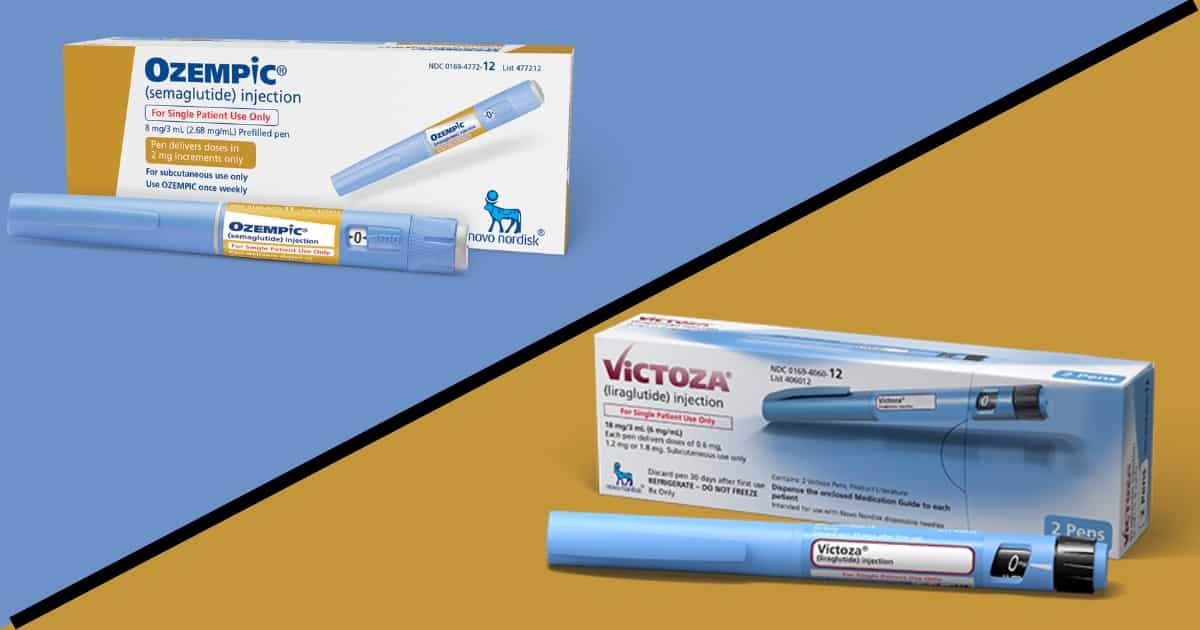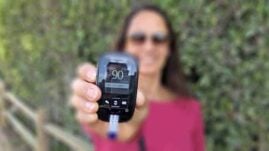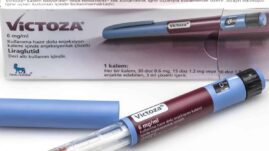Ozempic and Victoza are both glucagon-like peptide 1 (GLP-1) agonists that are used in the treatment of type 2 diabetes.
They help people better manage their blood glucose (sugar) levels, lower A1c levels, improve insulin sensitivity, and fight insulin resistance.

Key Facts
- While both Ozempic and Victoza are GLP-1 agonists used in managing type 2 diabetes, they contain different active ingredients.
- Both drugs increase insulin secretion and sensitivity, which helps with better blood sugar control and may lead to weight loss.
- Ozempic is taken weekly, while Victoza requires daily dosing.
- Both drugs come with potential side effects, such as gastrointestinal issues and more serious concerns like pancreatitis and an increased risk of thyroid cancer.
What are the active ingredients in Ozempic vs. Victoza?
Ozempic’s active ingredient is semaglutide, while Victoza contains liraglutide. Both medications belong to the class of glucagon-like peptide 1 (GLP-1) agonists, which are approved for the treatment of type 2 diabetes.
They function by enhancing insulin secretion in response to high blood sugar levels, slowing stomach emptying, and suppressing appetite, all of which help to improve blood sugar management and potentially help with weight management.
Although they have similar mechanisms of action, semaglutide and liraglutide have different chemical makeups and are not directly interchangeable.
Each drug may offer different benefits and risks, and the choice between them involves careful consideration of various factors, including effectiveness, side effects, dosing frequency, and individual preferences.
Allergies or sensitivities to the active ingredients of either medication also require careful selection and monitoring by a medical professional.
Why do people take Ozempic or Victoza?
Ozempic and Victoza are both used for the treatment of type 2 diabetes. They are liquid, injectable medications that are taken subcutaneously (just under the skin). Both help to lower blood sugar levels and A1c levels (a measure of glucose control over the previous 2 to 3 months).
By improving insulin resistance (a condition in which the body needs extra insulin to maintain normal blood sugar levels), slowing the rate of digestion, and suppressing appetite, they indirectly contribute to weight management.
However, it’s important to note that weight loss, while a common benefit, is not the primary purpose of these treatments.
In addition to blood sugar management, Ozempic and Victoza have shown cardiovascular benefits in people with type 2 diabetes and existing heart disease, potentially reducing the risk of heart attacks, strokes, and even all-cause mortality (death from all causes).
Occasionally, Ozempic or Victoza might be prescribed “off-label” (in a manner not approved by the U.S. Food and Drug Administration [FDA]) for people with prediabetes or type 1 diabetes to improve insulin resistance and glucose levels.
It’s important to be aware that Ozempic and Victoza are not prescribed together. Users are typically advised to use one or the other based on their medical team’s assessment of their specific situation.
Read more in: Everything You Need to Know About Ozempic and Everything You Need to Know About Victoza.
How are Ozempic and Victoza similar?
Ozempic and Victoza can both be used alone or in conjunction with other diabetes medications. However, they can never fully replace the use of insulin if you require insulin to treat your diabetes.
The following are additional similarities between the two medications:
Lower blood sugar and A1c levels
Ozempic and Victoza effectively lower blood sugar and A1c levels by mimicking the effects of the GLP-1 hormone, which naturally increases insulin secretion in response to elevated blood sugar levels.
This action is glucose-dependent, meaning that it primarily occurs when there is a need to lower blood glucose, which helps improve blood sugar management without significantly increasing the risk of hypoglycemia (low blood sugar).
In addition to boosting insulin release, these medications contribute to better blood sugar management by suppressing the secretion of glucagon, a hormone that typically signals the liver to release stored glucose into the bloodstream.
By reducing glucagon levels, Ozempic and Victoza help limit the liver’s release of glucose, further helping with the reduction of blood sugar levels.
May cause weight loss
While neither medication is FDA-approved as a weight loss drug, the medications suppress appetite and slow digestion, which cause many people to lose weight while taking either one.
Since they aren’t approved for weight loss by the FDA, there is no recommended dose to achieve this.
Speak with your doctor if you’re interested in losing weight and living with type 2 diabetes, as there are weight-loss medications approved by the FDA for people living with diabetes.
Learn more in: Can Ozempic Help You Lose Weight? and Victoza and Weight Loss: Can Victoza Help You Lose Weight?
Lower cardiovascular risks
Clinical evidence has demonstrated that both Ozempic and Victoza contribute to lowering cardiovascular risks in people with type 2 diabetes, especially those who also have heart disease.
For example, significant clinical trials such as the LEADER trial for Victoza and the SUSTAIN-6 trial for Ozempic have shown that these medications not only reduce the risk of major cardiovascular events but may also decrease the risk of cardiovascular-related death in this population.
Supporting this, a comprehensive meta-analysis (analysis of data from several studies) published in The Lancet has consolidated findings from various studies, affirming the cardiovascular benefits of these GLP-1 agonists.
Based on such robust evidence, the American Diabetes Association (ADA) recommends the use of GLP-1 agonists, including Ozempic and Victoza, for people with type 2 diabetes and heart disease as a strategy to decrease cardiovascular risk.
May cause adverse side effects
Both Ozempic and Victoza may cause adverse side effects.
These include:
- Nausea
- Vomiting
- Diarrhea
- Constipation
- Low blood sugar, especially when used in conjunction with insulin
They also may cause more serious side effects, including:
- Pancreatitis (inflammation of the pancreas)
- Kidney problems
- Increased risk of thyroid cancer
- Allergic reaction
To learn more about the potential side effects of both medications, read: Ozempic Side Effects: What You Need to Know and Victoza Side Effects: What You Need to Know.
They are name brands and expensive
Unfortunately, there are no generic versions of Ozempic or Victoza. They are both name brands and quite expensive. Some health insurance plans may not cover either one.
Check with your health insurance plan to see if it is included on the formulary and what your cost-sharing would be before starting the medication, as they can become quite cost-prohibitive over time.
They do not replace insulin
Neither Ozempic nor Victoza replaces insulin. These medications work alongside other treatments, including insulin, to help manage blood sugar levels effectively.
If you’re considering starting Ozempic or Victoza, it’s important to maintain your current treatment regimen, including insulin if prescribed, unless and until your healthcare provider advises a change.
They can be taken with or without food
GLP-1 agonists like Ozempic and Victoza offer considerable flexibility in administration, as they can be taken with or without food and at any time of day. This is in contrast to insulin and certain other diabetes medications, which often require more precise timing with meals.
While these medications are effective in lowering blood sugar levels overall, they have a low risk of causing acute low blood sugar on their own, thanks to their glucose-dependent mechanism of action.
This means they stimulate insulin release primarily in the presence of high blood glucose levels, minimizing the risk of blood sugar dropping too low under normal circumstances.
If you engage in physical activity after taking your injection, it’s unlikely to cause a rapid drop in blood sugar levels. However, as exercise can influence glucose levels, monitoring your response, especially with a new treatment regimen, is recommended.
For those who experience nausea after their injection, a common side effect, consuming bland foods like toast, bananas, rice, or crackers beforehand may help lessen this discomfort. As your body adjusts to the medication, this side effect may diminish over time.
Learn more in: Foods to Avoid While Taking Ozempic and Foods to Avoid While Taking Victoza.
How are Ozempic and Victoza different?
While Ozempic and Victoza share many similarities as GLP-1 agonists used in the management of type 2 diabetes, there are several key differences that might influence your choice:
Administration frequency
Ozempic is taken once weekly, making it a convenient option for those who prefer less-frequent dosing. In contrast, Victoza requires daily injections, which may be preferable for people who need finer control over their blood glucose levels or who experience milder side effects that go away quickly.
Find out more in: Ozempic Dosage Guide: How Much Should You Take? and Victoza Dosing: How Much Should You Take?
Approved populations
Ozempic is approved for use in adults ages 18 and up with type 2 diabetes. On the other hand, Victoza is approved for use in people ages 10 and up with type 2 diabetes.
Effect duration and side effects
Ozempic is longer-lasting, with a once-weekly dosing schedule. However, because it remains active longer, any side effects such as nausea or vomiting could also last for up to a week.
On the other hand, because Victoza is taken daily, the side effects typically diminish more quickly — usually within a day — as the medication’s effect wears off.
If the prospect of daily injections is a concern, or if you tend to forget daily medications, Ozempic’s weekly schedule might better suit your lifestyle.
It’s also important to be aware that the dosing of the two medications is completely different. Both require careful dosing adjustments that should be managed under the guidance of a healthcare provider.
Ozempic may cause diabetic retinopathy
Semaglutide, the active ingredient in Ozempic, may increase the risk of early worsening of diabetic retinopathy (damage to the retina of the eye), particularly in people who already have this eye condition.
This side effect was notably observed in the SUSTAIN-6 clinical trial, although it does not affect all users of the medication.
In contrast, Victoza has not been associated with a similar risk in major studies.
If you have pre-existing diabetic retinopathy or are concerned about potential eye health complications, it’s important to discuss these risks with your doctor before starting Ozempic. This conversation can help ensure that any treatment plan considers both your diabetes management needs and your overall eye health.
Frequently asked questions
Can I switch between the two drugs?
Yes, switching between Ozempic and Victoza is possible, particularly if you’re experiencing adverse side effects with one of them. However, because of their differing durations of action and potencies, specific waiting periods are recommended to ensure safety:
If switching from Ozempic to Victoza, wait a full week after your last dose of Ozempic before starting Victoza to allow the effects of the longer-acting Ozempic to diminish.
If switching from Victoza to Ozempic, wait 24 hours after your last dose of Victoza before taking your first dose of Ozempic.
Always make such changes under the guidance of your doctor. The dosages of Ozempic and Victoza are not equivalent, and your doctor will likely adjust your starting dose based on your needs and previous experiences with GLP-1 medications.
Even if you are on the highest dose of Victoza, your doctor may start you on a lower dose of Ozempic and adjust based on your response and any side effects.
Can you take Ozempic and Victoza at the same time?
No, it is not recommended to use two medications from the GLP-1 agonist class, such as Ozempic and Victoza, simultaneously.
Doing so does not increase their effectiveness and may increase the risk of severe side effects. While GLP-1 agonists generally have a low risk of causing hypoglycemia on their own, the combination of these drugs can potentially lead to an increased risk of gastrointestinal issues and other serious side effects such as pancreatitis.
It’s important to follow your healthcare provider’s guidance and use only the prescribed medication regimen.
If I lose enough weight taking Ozempic or Victoza, can I get off my other diabetes medications?
While it is possible for people taking Ozempic or Victoza to reduce or even discontinue other diabetes medications as a result of significant weight loss and improved blood sugar management, this is not guaranteed.
Weight loss can improve insulin sensitivity and reduce blood sugar levels, potentially decreasing the need for additional medications.
However, any adjustments to your diabetes treatment plan should be made cautiously and always under the guidance of a healthcare provider.
It is important to remember that while Ozempic and Victoza can significantly improve diabetes management, they do not cure the condition. The need for ongoing medication, including insulin, may persist, especially in those who have had diabetes for a long time.
This consideration is particularly critical for people with type 2 diabetes who might be able to reduce their dependence on insulin or other medications. In contrast, those with type 1 diabetes must continue insulin therapy as their bodies do not produce insulin.
If you experience any significant changes, such as unexpected weight loss or frequent low blood sugar episodes, speak with your doctor.






Bill
Ozempic vs Victoza
By Christine Fallabel On February 28, 2023, Updated June 13, 2023
My insurance denied my clinicians prescription for Ozempic calling for me to use Victoza instead. This article was extremely helpful and has informed me so I can be confident in using Victoza.
Thank you for your expertise!!